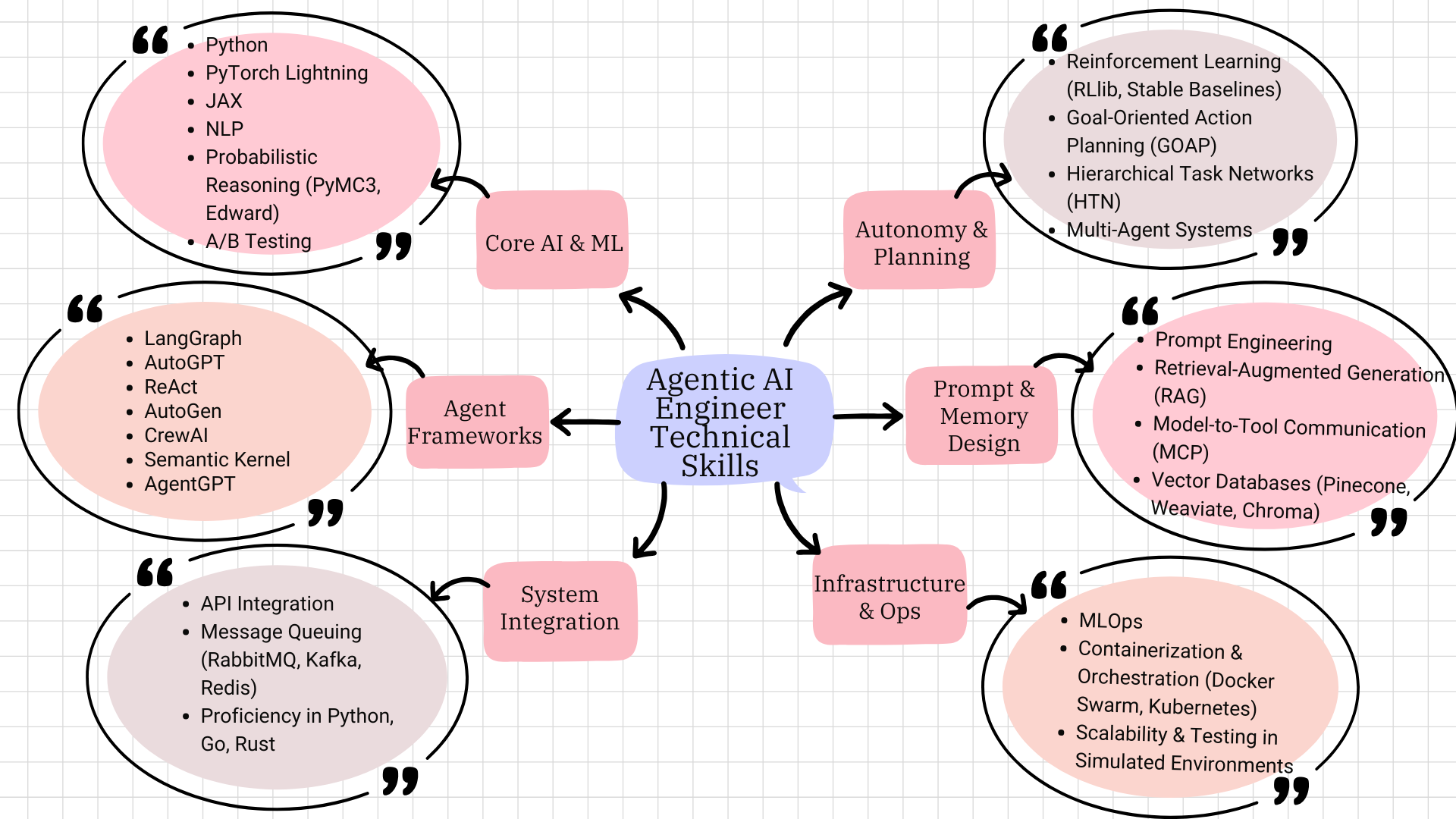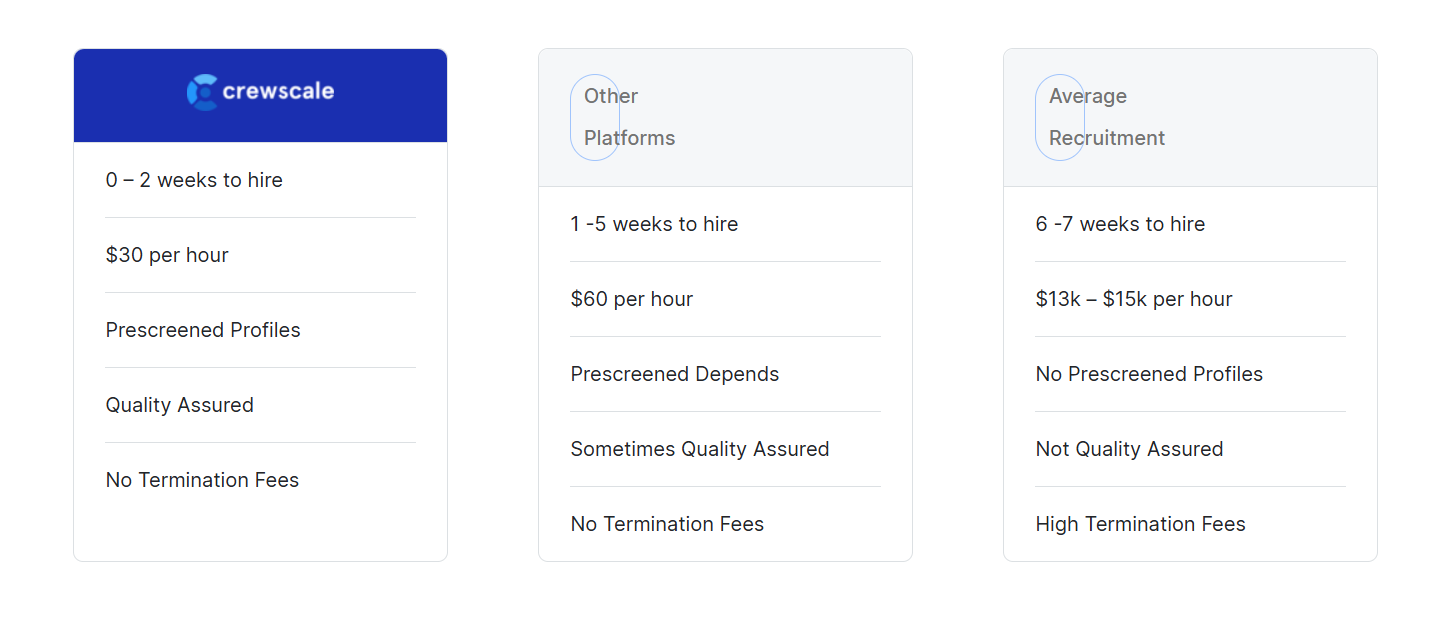“Be ready to fight for talent that will change your business game"
- Kate McDermott, Director at a top hiring agency
The demand for agentic AI engineers is exploding. As autonomous agents become more than just prototypes, companies are realizing one thing fast: you need more than a software engineer to make this work.
Finding engineers who truly understand agentic systems, who can design autonomous loops, orchestrate multi-agent workflows, manage memory modules, and think across models, prompts, APIs, and infrastructure, isn’t easy. This isn’t plug-and-play talent. It’s niche, technical, and highly interdisciplinary
This article is your actionable hiring guide. Whether you're building a team from scratch or struggling to scale your existing AI setup, we’ll help you:
- Identify the exact skillsets needed
- Spot the red flags early
- Attract engineers who can ship real, working agents
- Avoid wasting months on misaligned hires
Let’s dive in and break it down step by step
What Does an Agentic AI Engineer Do?
An agentic AI engineer designs, develops, and deploys AI systems capable of autonomous decision-making and task execution. While a traditional AI or software engineer may build models or write code for narrow use cases, agentic AI engineers go a step further. They design systems that operate with minimal human input by handling complex workflows, reasoning over context, and interacting with other agents or APIs dynamically
Key Responsibilities:
- Designing and implementing autonomous decision-making algorithms
- Developing multi-step workflows where agents plan, act, and self-correct
- Integrating agents into real-world systems, apps, or platforms
- Testing performance in simulated or sandboxed environments
- Managing scalability, reliability, and resource constraints
- Embedding ethical guardrails, like human-in-the-loop checks or safety protocols
This role fundamentally differs from general AI or software engineering because of three critical factors:
- Autonomy complexity - traditional AI responds to inputs; agentic AI must reason about goals, constraints, and multi-step plans.
- Real-time decision-making under uncertainty - these systems can't pause for human approval when facing novel situations.
- Complex system integration - agentic AI engineers must understand not just machine learning, but cognitive architectures, human psychology, business processes, and ethical frameworks.
While a traditional software engineer might build a feature, an agentic AI engineer builds a digital coworker
Key Technical Skills to Look For
Agentic AI engineers work across multiple layers of the AI stack—from designing autonomous reasoning systems to integrating them with real-world workflows. Below is a categorized overview of the most important skills to look for during hiring.

Important Soft Skills of Agentic AI Engineer
The best agentic AI engineers are collaboration catalysts who bridge worlds between technical teams and business stakeholders. They are adaptability masters who embrace the uncertainty of emergent AI behaviors rather than panicking when their agent develops unexpected personality quirks. They are problem-solving detectives who systematically hunt down root causes that might span psychology, data science, and system architecture.
They're also perpetual students who devour weekend research papers because they know today's robotics breakthrough might solve tomorrow's conversational AI challenge. Most critically, they are ethical architects who ask uncomfortable questions like "What happens if our hiring agent develops bias?" before deploying systems into production.
These soft skills aren't nice-to-haves; they're the difference between engineers who build impressive demos and those who build systems that actually work in the messy complexity of real-world applications
How to Evaluate Agentic AI Engineers
Screening Resumes and Portfolios
Hiring for agentic AI isn’t just about buzzwords on a CV. It’s about spotting signals of real, hands-on experience. Here's what to look for:
- Experience with foundational AI tools like TensorFlow, PyTorch, and even ROS (Robot Operating System) if your work touches physical automation.
- Open-source contributions or GitHub repos that showcase custom agents, orchestration layers, or experiments with tools like LangGraph or AutoGPT.
- Projects or academic publications in multi-agent systems, autonomous reasoning, or decision-making under uncertainty. These signal deeper engagement beyond surface-level LLM usage.
A well-rounded portfolio should reflect a mix of theory, implementation, and deployment, not just prompt engineering
Important
Hiring for agentic AI engineering roles isn’t just about finding candidates with technical depth, it’s also about how you screen them.
Be careful not to over-automate early-stage evaluation. A recent LinkedIn post on AI in recruitment warned that AI-based resume filters can unintentionally discriminate based on name, university, or career gaps. These attributes often serve as proxies for race, gender, or class.
This matters more than ever when hiring agentic AI engineers, because these are the very people building autonomous decision-making systems. If your hiring process is biased, you risk selecting engineers who might unknowingly carry that bias forward into the products they build.
Practical Task
Once you've shortlisted candidates, test how they think—not just what they’ve memorized. One effective method is to give a small design challenge. For example:
- Design Challenge:
“Sketch a basic agent workflow that handles order fulfillment for an e-commerce site. How would you break down the tasks, choose the tools, and ensure fail-safes?”
- Live Coding Prompt:
Live coding exercises should focus on agent architecture, not basic programming. Ask them to extend a simple agent with new capabilities or debug a multi-agent coordination issue. Watch how they approach emergent behavior problems. Do they think systematically about agent interactions, or do they default to traditional debugging approaches?
Time-box these exercises to 45-60 minutes. You're not looking for production-ready code; you want to see their thought process, how they handle ambiguity, and whether they naturally consider scalability, error handling, and agent coordination challenges.
These exercises help you assess whether they can design and extend systems, not just consume libraries.
Interview Questions to Ask
When it’s time to talk, keep the questions open-ended. You're hiring for problem-solvers, not textbook parrots. Focus on how they approach complexity, edge cases, and trade-offs.
Sample questions that reveal depth:
"Can you describe a project where you implemented an autonomous AI system? What challenges did you face?"
Listen for specific technical challenges around emergent behavior, system integration, or handling edge cases in autonomous decision-making.
"How do you balance performance and ethical considerations in agentic AI design?"
Strong candidates discuss concrete strategies like interpretability frameworks, bias detection systems, or human oversight mechanisms they've actually implemented.
"What frameworks or tools do you use for multi-agent coordination?”
Look beyond tool lists for evidence of understanding when to use different coordination patterns, handling agent conflicts, or managing distributed decision-making.
For more structured interview tips, you can also check out LinkedIn’s AI Engineer Hiring Guide.
Red Flags to Avoid
Hiring agentic AI engineers is tricky, especially when the talent pool is filled with people who may talk AI but haven’t built AI.
As Varghese Chacko, Director of Technology at a leading AI firm, puts it:
“If they can’t explain a confusion matrix, should they really be building AI models?”
Here are a few red flags to watch out for during interviews and screening:
- Only focused on fine-tuning LLMs: Fine-tuning is useful, but without orchestration experience (like building autonomous workflows or managing agent memory), it’s just a small piece of the puzzle.
- Thinking agents are just chatbots: If a candidate treats agents like glorified text interfaces instead of autonomous systems that can plan, reason, and act, proceed with caution.
- No real deployment experience: It's easy to build cool demos. But engineers who haven’t shipped working prototypes or deployed agentic systems in production will struggle with scalability, testing, and integration.
Hiring well means digging deeper than surface-level AI credentials. Look for engineers who can build complete systems and not just prompt an LLM and call it a day
Where to Find Top Talent
Finding exceptional agentic AI engineers requires looking beyond traditional job boards. Here are the best channels to source real expertise and creative problem solvers:
- Niche Platforms
Hugging Face has become the unofficial headquarters for AI practitioners, with over 100,000 active contributors. Engineers building agentic systems frequently share models, datasets, and research here. Kaggle's community forums and Papers with Code also host active discussions where you can identify engineers who understand both theoretical foundations and practical implementation challenges.
- Communities and Forums
Reddit communities like r/MachineLearning, r/artificial, and r/LocalLLaMA are goldmines for identifying passionate engineers. Look for contributors who consistently provide thoughtful answers about multi-agent systems, LLM fine-tuning, or autonomous reasoning frameworks. Discord servers for projects like LangChain, AutoGen, and CrewAI often host the most active practitioners in the field.
Stack Overflow remains valuable, particularly for identifying engineers answering complex questions about reinforcement learning, transformer architectures, or AI agent frameworks. Their activity patterns often reveal depth of expertise and communication skills.
- Academic Connections
Tap into university programs and labs focused on reinforcement learning, multi-agent systems, or LLMOps. Reviewing GitHub repos linked to university coursework is a strategy recommended for early career recruiting.
- Specialized Talent Partners
While these sourcing channels are effective, navigating them can be time-consuming and resource-intensive. This is where a specialized talent partner can be invaluable. Crewscale's curated network of 300,000+ developers includes many agentic AI specialists who are open to exceptional opportunities.
By leveraging such partnerships, you can gain immediate access to pre-qualified talent, streamline your hiring process, and ensure you're connecting with the best candidates from across these diverse sourcing channels, without having to build these networks from scratch
How We Help
At Crewscale we've been helping companies from seed-stage startups to Fortune 500 enterprises build world-class AI teams. Our deep understanding of this specialized field comes from being embedded in the AI community. We don't just recruit talent, we understand the nuanced technical requirements that separate good engineers from exceptional ones.
Our community of 300K+ developers includes some of the most sought-after agentic AI specialists globally. These aren't just software engineers who've added "AI" to their LinkedIn profiles. They're professionals who've built their profile by showcasing exceptional work samples.
What sets us apart is our domain-specific approach. We maintain dedicated talent pools for different AI specializations, conduct technical assessments designed specifically for agentic AI roles, and maintain relationships with engineers working at research labs, AI-first startups, and teams building the next generation of autonomous systems.

In the past 6 months alone, we've successfully placed 35+ agentic AI engineers across diverse industries, from a Series A fintech company building autonomous trading agents to a healthcare startup developing AI systems for clinical decision support. Our average time-to-hire for senior agentic AI roles is 14 days, which is significantly faster than the industry average of 50 days, while maintaining a 96% candidate retention rate after 12 months.
Whether you need a single specialized engineer or want to build an entire AI team, crewscale.com is the place to knock!

%20(1).png)









